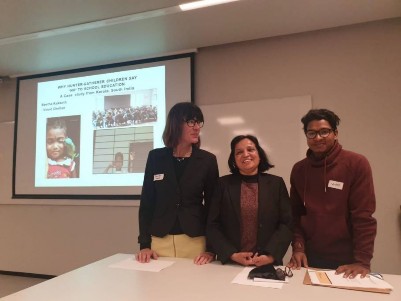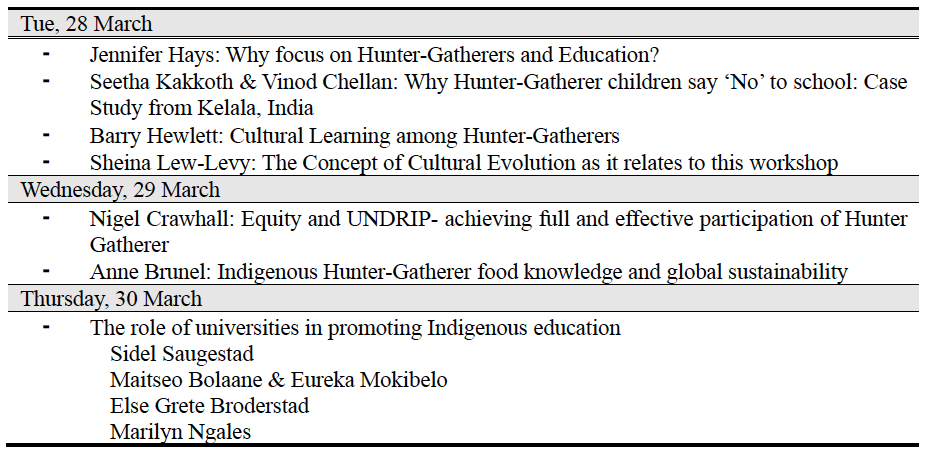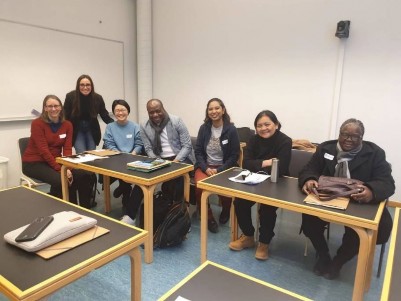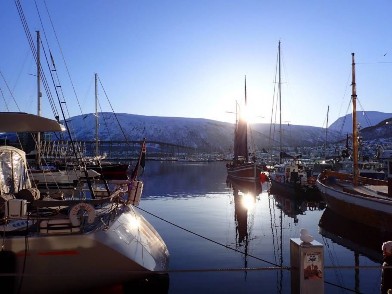Repot on Dispatch to Norway: Participating the workshop “Contemporary hunter-gatherers and education in a changing world: Towards sustainable futures”
Tomoe Noguchi
2nd year graduate student
Division of African Area Studies
Graduate School of Asian and African Area Studies
Kyoto University
Dispatch period: From March 26 to April 2, 2023
Destination of Dispatch: Tromsø, Kingdom of Norway
Keywords: Child, Education, Hunter-Gatherer
1. Introduction
The purpose of this dispatch was to participate in the international workshop “Contemporary hunter-gatherers and education in a changing world: Towards sustainable futures” as part of the Scientific Research (S) “Ecological future making of childrearing in contact zones between hunter-gatherers and agro-pastoralists in Africa”. The workshop consisted of reports by the researcher and party of hunter-gatherer society, appreciation of visual materials, and groupwork for 3 days.
2. Details of the workshop

2.1 Reports on schooling for children in Hunter-Gatherer society (Table 1)
During the reports, issues in community-centered quality education based on the actual conflicts in the educational environment between characteristics of child socialization in the hunter-gatherer societies and education provided in the school were pointed out (Photo 1). It was also argued how should suggest and take dialogue with the local government and international affairs for knowledge such as child development and environment in the hunter-gatherer societies. The possibility of uniting the practice in hunter-gatherer societies and scientific knowledge and the role of the institution of higher education were discussed as well.
Figure1: Overview of reports


2.2 Groupwork
The author participated in the group of the Policy Brief Templates (Photo 2). This group aimed to find a way to communicate with the decision-makers such as local government and international affairs for alternative educational schemes to the contemporary issues of schooling in the children of hunter-gatherer societies. The participants included researchers or educational activists who work in Botswana, Cameroon, Indonesia, Philippine, and Tanzania.
On the first day, issues for the educational settings where in each field of participants were shared. Although, these issues were summarized in three points: 1) medium of instruction, 2) cultural response for hunter-gatherer’s children, and 3) accessibilities for school, detailed situations in each community were diverse. Thus, consensus for the progress of this working group could not be found.
We continued the discussion on the 2nd day of group work with Mr. Crawhall (chief of the section for the UNESCO Local and Indigenous Knowledge Systems programme). He pointed out that the factors that hinder cooperation between communities and government or international affairs include inadequate communication in either of the following processes: 1) the government’s identification of the needs of local communities, and 2) community implementation of educational-related guiding principles by international affairs. To effective cooperation, he also emphasized the importance of indicating the feasibility of the plan based on the performance evaluation and clear proposal, and the evaluation scales were introduced as well.
Then, we continued further work in this group based on the suggestion by Mr. Crawhall. The consensus which to make the poster and white paper to communicate with decision-makers based on the data which describe the actual situation of schooling in the children of hunter-gatherer societies was indicated. United Nations, Non-Governmental Organizations, UNESCO, and local governments were identified as the target institutions of this project. This work will continue through the online meeting to implement for the actual situations.
3. Prospect

This workshop was a great opportunity to understand the contemporary situations for child schooling in hunter-gatherer societies in the world including African region. The non-formal education as the author’s research interests was also shared with other participants through the discussion during the break time and the partnership for the research was assured. Over the years, issues on child schooling in New Xade, Botswana as author’s research field have also been argued. However, the situation has not improved. Not only describing the reality of the communities but also sharing and creating a hopeful future with them are also expected for the area studies. Further discussion is needed for the most approved community-based decision making on the education of children in hunter-gatherer societies.
